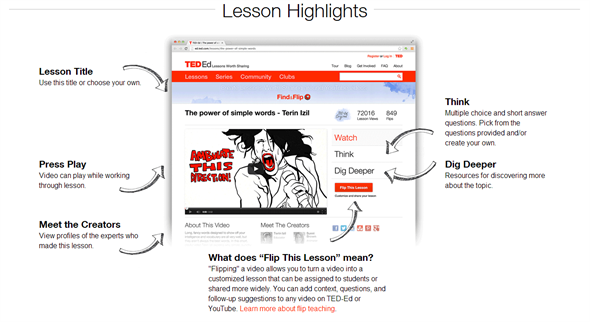The University of Home: 32 E-learning Sites for Higher & Adult Education
Last week we looked at e-learning resources for kids. This week we explore how top universities have increasingly moved into online education, the startups facilitating the trend, and resources for adult education and career advancement.
The idea of getting a degree remotely was nearly unthinkable a few years ago, but with broadband access in 70% of today’s homes it is easier than ever. A recent study found the number of college students taking at least one online course nearly doubled from 23 percent to 45 in the past five years.
Some students are taking courses online from their university or college; others are supplementing or preparing for courses using non-traditional options like Lynda.com (listed below). You can improve your grades with some of these tools, or increase your overall marketability by taking design or programming classes, for example.

[The functions of a TED-Ed lesson, explained]
There are a large number of universities and organizations tapping into the open courseware movement. Some offer just their own courses; others are joining collaborative efforts to showcase courses from a wide variety of schools and programs. Here are just a few well-known universities:
- CourseSites MOOC Catalog offers a great overview of courses from a variety of universities.
- Berkeley Webcasts is a collection of lectures that they post online.
- Carnegie Mellon open learning initiative.
- Berkeley, Harvard, MIT, and the University of Texas, among many others, have teamed up to create edX – an open online course collection.
- Stanford Engineering is an online portal offering ten courses from Stanford’s School of Engineering— including the three-course introductory sequence in Computer Science— free of charge.
- MIT OpenCourseWare
- NovoEd (previously Venture Lab) offers a mix of free and fee-based courses. Many are aimed at students interested in entrepreneurship.
- Open Yale Courses is a selection of over 40 of the Ivy’s introductory classes, free of charge.
- Saylor is a foundation that believes education should be free. They have a wide range of courses from credentialed instructors.
- Coursera is one of the more innovative online educational initiatives – which began in Stanford, but has rapidly grown. It has hundreds of courses from 85 educational partners.
- Knollop is a beta offering that aggregates from many of the sites mentioned here in this post.
Online learning, full courses and supplemental courses, through non-traditional educational sites:
- Lynda.com is one of the best examples of online education, in bite-sized chunks. For a reasonable annual fee, you can enhance your technical skills, your business acumen, and your design chops, just to name a few.
- StudyMode is a network of online learning tools, geared towards high school and college students. The site helps students share and review study materials such as flash cards, research papers and book notes.
- Codecademy is naturally aimed at helping you learn how to do computer coding.
- Khan Academy is a well-known video tutorial site for all levels of learners.
- General Assembly is a startup incubator and co-workspace community is also an online/offline educator with locations in 8 cities worldwide.
- TED’s TED-Ed uses the provocative and entertaining video talks from the storied TED conference as the basis for online lessons.
- Udacity is aimed at helping you with your career in technology.
- Udemy offers a wide range of free and fee-based courses. One of the interesting aspects is you can see the reviews/ratings alongside how many students have taken the course.
- Videolectures.net has specific lectures from courses around the world.
- OpenSesame is an online training repository for your business needs.
- Class Central is an aggregation site that collects open courses from open universities and colleges.
Whether you are enrolled full time at a university or thinking of upgrading your skills, all of these online courses can be completed at home. You don’t need high speed access, but it certainly helps when you are streaming lengthy videos or downloading course materials. The world of education is changing – join the growing percentage of lifelong learners.